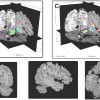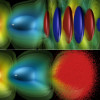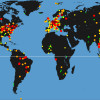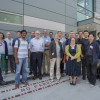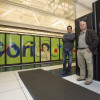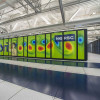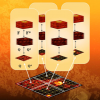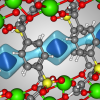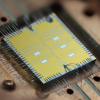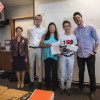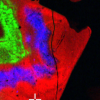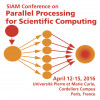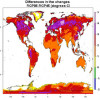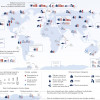News Center
Brain Modulyzer Provides Interactive Window Into the Brain
A new tool developed at Berkeley Lab allows researchers to interactively explore the hierarchical processes that happen in the brain when it is resting or performing tasks. Scientists also hope that the tool can shed some light on how neurological diseases like Alzheimer’s spread throughout the brain. Read More »
The Incredible Shrinking Particle Accelerator
WarpIV, a new data analysis/visualization toolkit developed at Berkeley Lab, is designed to help speed particle accelerator research and design by enabling in situ visualization and analysis of accelerator simulations at scale. Read More »
Scientific Diplomacy: Berkeley Lab Hosts 2016 TechWomen
In September two researchers from Africa visited Berkeley Lab as part of the State Department’s TechWomen—an international exchange that brings emerging women leaders in STEM from Africa, Central Asia and the Middle East together with their professional counterparts in the U.S. Read More »
Longest Record of Continuous Carbon Flux Data is Now Publicly Available
Approximately 450 carbon flux sites worldwide are sharing their observation data with the FLUXNET database. The project’s most recent data release—FLUXNET2015—includes some of the longest continuous records of ecosystem data ever taken. Read More »
Berkeley Lab Collaboration Enhances Optical Chip Design Process
A unique collaboration between computers scientists and mathematicians from Berkeley Lab's Computing Sciences group and Ciena, a major U.S. telecommunications equipment provider, has helped dramatically improve design cycle times for Ciena's high-speed optical networking components. Read More »
Berkeley Lab Hosts UK Scientific Technology Facilities Council
Twelve members of the UK’s Scientific Technology Facilities Council visited Berkeley Lab to discuss approaches for managing and analyzing the deluge of data being produced by current and next-generation synchrotron light sources. Read More »
Berkeley Lab to Lead 5 Exascale Projects, Support 6 Others
Scientists at the Department of Energy’s (DOE) Lawrence Berkeley National Laboratory (Berkeley Lab) will lead or play key roles in developing 11 critical research applications for next-generation supercomputers as part of DOE’s Exascale Computing Project (ECP). Read More »
Berkeley Lab to Partner with Five U.S. Manufacturers Via HPC4Mfg Program
The U.S. Department of Energy’s High Performance Computing for Manufacturing (HPC4Mfg) Program has announced $3.8 million in funding for 13 new industry projects in the second round of the HPC4Mfg program, and Lawrence Berkeley National Laboratory has been selected to partner with five of the new projects. Read More »
SHARP: A "Killer App" for Ptychography
A revolutionary x-ray imaging technique that combines diffraction and microscopy, has now been coupled with applied mathematics and supercomputing to quickly turn high-throughput "imaging by diffraction" datasets into the sharpest 3D images ever produced. Read More »
Livermore, Berkeley National Labs Leading Project to Increase Power Grid Cybersecurity
Cybersecurity experts Jamie Van Randwyk of Lawrence Livermore National Laboratory (LLNL) and Sean Peisert of Lawrence Berkeley National Laboratory (Berkeley Lab) are leading a new program to develop new data analysis methods to better protect the nation’s power grid. The project, “Threat Detection and Response with Data Analytics,” is part of DOE's $220 million, three-year Grid Modernization Initiative. Read More »
Models Help Pinpoint Material for Better Nuclear Fuel Recycling
Researchers are investigating a new material that uses pores to screen out and capture for reuse the xenon and krypton gases released during nuclear fuel reprocessing. This metal organic framework (MOF) has the potential to save energy, make reprocessing cleaner and less expensive. Read More »
CRD’s Wes Bethel Presents Paper on In Situ Methods and Infrastructure at Eurovis 2016
Wes Bethel, who leads CRD’s Data Analytics and Visualization Group, presented State-of-the-Art Report paper “In Situ Methods, Infrastructures and Applications on High Performance Computing Platforms” at the Eurovis 2016 conference last week. The conference was held June 6-10 at the University of Groningen in the Netherlands. Read More »
New Mathematics Accurately Captures Liquids and Surfaces Moving in Synergy
Berkeley Lab researchers in the Computing Sciences Division have developed a new mathematical framework that allows researchers to capture fluid dynamics at unprecedented detail. The work could be used in a range of applications, like optimizing the shape of a propeller blade and the ejection of ink droplets in printers. Read More »
High-performing hybrid
Berkeley Lab Alvarez Fellow Jarrod McClean is preparing for a quantum-classical computing future by yoking quantum processors with classical HPC systems into a hybrid computer. Read More »
Brian Friesen Helps Cray Surprise an Inquisitive High School Student
Brian Friesen, a post-doc working closely with CRD’s Center for Computational Sciences and Engineering, tweaked his travel plans to help an inquisitive high school student to calculate the probability of surviving a zombie apocalypse. He also helped answer student questions about math and supercomputers. Read More »
Berkeley Lab’s OpenMSI Licensed to ImaBiotech
Two years ago, Berkeley Lab researchers developed OpenMSI—the most advanced computational tool for analyzing and visualizing mass spectrometry imaging (MSI) data. Now, OpenMSI has been licensed to support ImaBiotech’s Multimaging™ technology in the field of pharmaceutical and cosmetic research and development. Read More »
Scott Baden: CRD’s Computer Languages and System Software Group Lead
Scott Baden has been named Computer Languages and Systems Software Group Lead in Berkeley Lab’s Computational Research Division (CRD). In addition to managing the group, he will also be doing research on program restructuring to improve performance on supercomputers and also look into novel implementation techniques that may someday be incorporated in an automated program-restructuring tool. Read More »
CRD’s Xiaoye 'Sherry' Li Named 2016 SIAM Fellow
Berkeley Lab’s Xiaoye “Sherry” Li has been named a 2016 fellow of the Society for Industrial and Applied Mathematics (SIAM). She being recognized for advances in the development of fast and scalable sparse matrix algorithms and fostering their use in large-scale scientific and engineering applications. Read More »
Berkeley Lab Staff Contribute Papers to SIAM Conference on Parallel Computing
When the seventeenth meeting of the Society for Industrial and Applied Mathematics (SIAM) Conference on Parallel Processing for Scientific Computing is held April 12-15 in Paris, France, a number of Berkeley Lab staff will contribute their expertise in papers and invited talks. Read More »
CRD’s Bert de Jong Named to Editorial Board of Computer Physics Communications Journal
Bert de Jong, leader of CRD’s Computational Chemistry, Materials & Climate Group, has been named as Specialist Editor for the journal Computer Physics Communications, an international journal and program library for computational physics and physical chemistry. Read More »
New study details the searing future of extreme heat
Heat waves that typically strike once every 20 years could become yearly events across 60 percent of Earth's land surface by 2075, if greenhouse gas emissions continue unchecked.
If stringent emissions-reductions measures are put in place, however, these extreme heat events could be reduced significantly. These are among the findings of a new study from Berkeley Lab and NCAR. Read More »
Updated Workflows for New LHC ERA
To deal with the new data deluge from a recently upgraded Large Hadron Collider (LHC), researchers working on one of the facility's largest experiments—ATLAS—are relying on updated workflow management tools developed primarily by a group of researchers at the Berkeley Lab. Read More »
Xiaoye "Sherry" Li to Lead CRD Scalable Solvers Group
Sherry Li has been selected to lead the Scalable Solvers Group in Berkeley Lab’s Computational Research Division (CRD). Her appointment was effective on February 12, 2016. Read More »
Assessing the Impact of Human-Induced Climate Change
Berkeley Lab and Potsdam Institute for Climate Impact Research scientists develop and apply new method to determine whether specific climate impacts can be traced to human-caused emissions. Read More »
ESnet, CENIC Announce Joint Cybersecurity Initiative
CRD's Sean Peisert will be director of the new CENIC/ESnet initiative to jointly develop cybersecurity strategies and research projects. Peisert, who was also recently named as the chief cybersecurity strategist for CENIC, has worked extensively in computer security research and development. Read More »









